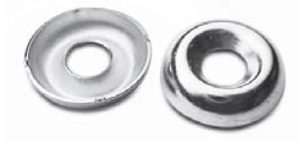
When researching the different styles of washers, you may come across finishing washers. They are disc-shaped plates with a hole in the center. You can use finishing washers in conjunction with screws or bolts. While all washers support threaded fasteners such as these, however, finishing washers provide a touch of aesthetics that distinguishes them from the rest.
Overview of Finishing Washers
Finishing washers are countersunk washers that are designed to distribute the load of a threaded fastener while simultaneously offering a clean finish. Screws and bolts are threaded fasteners. Rather than driving a screw or bolt directly into an object, you may want to use a washer. The washer will distribute the load of the fastener so that the object is better protected against damage.
Finishing Washers vs Other Washers
All washers are capable of distributing the load of a threaded fastener, but only finishing washers are designed specifically to offer a clean finish — hence the name “finishing washers.”
Finishing washers are characterized by a countersunk design. The head of the screw or bolt with which they are used will sit flush with them. Other washers, in comparison, don’t offer a countersunk design. If you use a traditional washer with a screw or bolt, the fastener’s head will stick out of it.
Why Choose Finishing Washers
Why should choose finishing washers exactly? When using fasteners on visible parts, you should consider their appearance. The wrong fasteners may result in a messy appearance. Finishing washers, however, will help you create a clean appearance with your fasteners. You can use them in conjunction with screws or boles. Finishing washers will conceal the fasteners’ heads by allowing them to sit flush.
Contrary to common belief, finishing washers aren’t designed strictly for aesthetics. They can certainly improve the aesthetics of fasteners, parts or objects, but they still offer the same load-distribution benefits as traditional washers. If you’re worried about accidentally damaging a part or object with a fastener, you may want to use a finishing washer. The finishing washer will distribute the fastener’s load so that damage is less likely to occur.
Finishing washers are durable. They are available in different materials. Some of them are made of copper alloy, whereas others are made of steel. In addition to a strong and durable core material, many of them feature a surface treatment. Chromium, for instance, is a popular surface treatment for finishing washers. Chromium protects the finishing washers from corrosion while also providing a clean, reflective finish.



